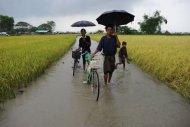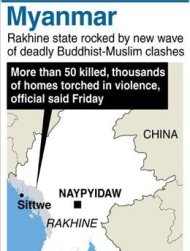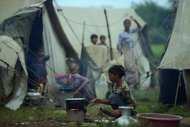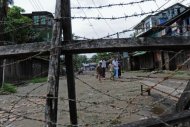At least 56 people have been killed and thousands of homes torched in
Buddhist-Muslim violence in Myanmar, casting a shadow over the reformist
government's attempts to remake the country's global image.
People have fled their homes in droves after the latest clashes in
western Rakhine state, which was rocked by violence in June that split
communities and left tens of thousands of mainly Muslim Rohingya living
in camps."Twenty-five men and 31 women have been killed in four townships and 2,000 houses were burnt," Rakhine state spokesman Win Myaing told AFP, while an official in Yangon who requested anonymity said the toll could be as high as 67.
More than 150 people have now been killed in the state since June, according to the authorities, who have imposed emergency rule in the face of continued explosive tension in the region.
The United Nations responded to the bloodshed Friday with a stark warning that Myanmar's reforms are under threat from the continued unrest between ethnic Rakhine and the Rohingya.
"The vigilante attacks, targeted threats and extremist rhetoric must be stopped," a spokesman for Secretary-General Ban Ki-moon said in a statement released in Yangon.
"If this is not done... the reform and opening up process being currently pursued by the government is likely to be jeopardised."
President Thein Sein has been widely praised for overseeing sweeping reforms in the former junta-ruled nation, including the release of hundreds of political prisoners and the election of opposition leader Aung San Suu Kyi to parliament.
But the Rakhine violence poses a stern challenge to the reform process.
State media on Friday took the rare step of acknowledging the damage the resurgent violence is causing to the nation's image at a pivotal moment in its transition from authoritarian rule.
The violence comes as the "international community is watching", a statement signed by the president's office said in government mouthpiece New Light of Myanmar -- putting the death toll from the recent unrest at 12.
Myanmar's 800,000 Rohingya are seen as illegal immigrants from neighbouring Bangladesh by the government and many Burmese -- who call them "Bengalis".
The latest violence, which prompted Myanmar's main Islamic organisations to cancel celebrations for the four-day Eid al-Adha holiday that began on Friday, is seen as serious challenge to the government.
Washington joined the United Nations to swiftly condemn the violence, with US State Department spokeswoman Victoria Nuland urging both sides "to exercise restraint and immediately halt all attacks".
Security has been stepped up in affected areas, including around the state's main tourist attraction of Mrauk U and Kyaukpyu, where a major pipeline to transport Myanmar gas to China begins.
An ethnic Rakhine resident in Mrauk U contacted by AFP from Yangon said the situation in his township had calmed on Friday.
"We heard that more security forces were sent from Sittwe (the state capital) to Mrauk U," Tun Tun said, adding some shops have been closed since violence flared.
AFP journalists visiting Rakhine just before the renewed unrest saw thousands of Muslim Rohingya trapped behind barbed wire and armed guards in a ghetto in the centre of the capital.
Tens of thousands more are housed in camps beyond the city limits as segregation between the two communities becomes more pronounced.
There have been a number of anti-Muslim protests by Buddhists recently.
The stateless Rohingya, speaking a Bengali dialect similar to one in Bangladesh, have long been considered by the United Nations as one of the most persecuted minorities on the planet.
Bangladesh on Thursday mobilised extra patrols along its river border with Myanmar amid reports of dozens of boats carrying Rohingya Muslim refugees fleeing the clashes.
Bangladesh drew criticism from the UN after it turned back boatloads of Rohingya, mainly women and children, after the June violence. But the nation said it would not accept any new refugees because it was already dealing with an estimated 300,000 Rohingya.
The UN's refugee arm has said it fears large numbers of Rohingya will attempt the perilous sea journey south over the coming weeks to escape violence in Rakhine and the sprawling refugee camps in Bangladesh.
More about the story
- Three dead in new wave of Myanmar communal clashes
- Myanmar sets curfew after new violence in northwest
- In Myanmar's volatile west, sectarian violence worsens
- Students lead anti-Rohingya rally in Myanmar
- Buddhist monks march in Myanmar to thwart Islamic office plan
- Myanmar monks protest in unrest-hit state
- Myanmar leader says open to aid for Muslims
-
MyanmarAFP News





ไม่มีความคิดเห็น:
แสดงความคิดเห็น